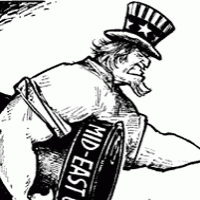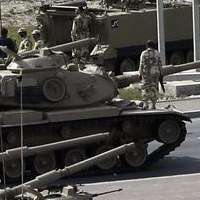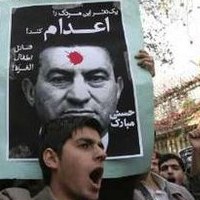![]()
Sat, Nov 19, 2011 | WikiLeaks

Press conference with Syrian president Bashar al-Assad and Iranian president Mahmoud Ahmadinejad. (ISNA photo / Rooholla Vahdati)
WikiLeaks: Syrian-Iranian Show of Solidarity Masks Tensions over Iraq, Yemen and War with Israel
The successive visits of three high-level Iranian officials to Damascus in early December appear at first glance to reaffirm strong Iranian-Syrian security ties and other forms of bilateral cooperation, but they may, in fact, mask deepening rifts over Iraq, Yemen, and the possibility of war with Israel.
Syrian observers suggest the a shifting balance of power between Iran and Syria. The Iranian government, challenged domestically by anti-regime protests and abroad by building pressure over its nuclear program, has sought Syria’s help just when Syria has begun to enjoy other strategic options, such as its relations with Turkey and Saudi Arabia. Asad’s government proved willing to host the visits, sign a defense MOU, and allow Hamas Politburo Chief Khaled Meshaal to visit Tehran, all the while continuing close cooperation with Iranian security services and Hizballah operatives. But Asad reportedly resisted Iranian arguments for closer bilateral coordination in Iraq and Yemen and flatly rejected being drawn into a war between Iran and Israel.
Source: WikiLeaks
Reference Created Classification Origin 09DAMASCUS880 2009-12-22 03:40 SECRET/NOFORN Embassy Damascus
VZCZCXRO2360
OO RUEHROV
DE RUEHDM #0880/01 3560340
ZNY SSSSS ZZH
O 220340Z DEC 09
FM AMEMBASSY DAMASCUS
TO RUEHC/SECSTATE WASHDC IMMEDIATE 7147
INFO RUEHXK/ARAB ISRAELI COLLECTIVE PRIORITY
RUEHAK/AMEMBASSY ANKARA PRIORITY 5891
RUEHRL/AMEMBASSY BERLIN PRIORITY 0233
RUEHLO/AMEMBASSY LONDON PRIORITY 0829
RUEHFR/AMEMBASSY PARIS PRIORITY 0783
RUEHRO/AMEMBASSY ROME PRIORITY 0999
RUEHSM/AMEMBASSY STOCKHOLM PRIORITY 0145
RUEHDE/AMCONSUL DUBAI PRIORITY 0261
RUEHFT/AMCONSUL FRANKFURT PRIORITY 2473
RUEHIT/AMCONSUL ISTANBUL PRIORITY 0438
RUEKJCS/CJCS WASHDC PRIORITY
RHMFISS/CDR USCENTCOM MACDILL AFB FL PRIORITY
RUEKJCS/SECDEF WASHDC PRIORITY
RUEKJCS/JOINT STAFF WASHDC PRIORITY
RHMFISS/HQ USCENTCOM MACDILL AFB FL PRIORITY
RHEHNSC/NSC WASHDC PRIORITY
RUCNDT/USMISSION USUN NEW YORK PRIORITY 0773Tuesday, 22 December 2009, 03:40
S E C R E T SECTION 01 OF 04 DAMASCUS 000880
NOFORN
SIPDISDEPARTMENT FOR NEA/FO, NEA/ELA, NEA/I
NSC FOR SHAPIRO/MCDERMOTT
PARIS FOR NOBLES
LONDON FOR LORDEO 12958 DECL: 12/20/2029
TAGS PREL, IR, LE, IZ, TU, SY
SUBJECT: SYRIAN-IRANIAN SHOW OF SOLIDARITY MASKS TENSIONS
OVER IRAQ, YEMEN, AND WAR WITH ISRAELDAMASCUS 00000880 001.2 OF 004
Classified By: CDA Chuck Hunter for reasons 1.4 b and d.
¶1. (S/NF) The successive visits of three high-level Iranian officials to Damascus in early December appear at first glance to reaffirm strong Iranian-Syrian security ties and other forms of bilateral cooperation, but they may, in fact, mask deepening rifts over Iraq, Yemen, and the possibility of war with Israel. Syrian observers suggest the a shifting balance of power between Iran and Syria. The Iranian government, challenged domestically by anti-regime protests and abroad by building pressure over its nuclear program, has sought Syria’s help just when Syria has begun to enjoy other strategic options, such as its relations with Turkey and Saudi Arabia. Asad’s government proved willing to host the visits, sign a defense MOU, and allow Hamas Politburo Chief Khaled Meshaal to visit Tehran, all the while continuing close cooperation with Iranian security services and Hizballah operatives. But Asad reportedly resisted Iranian arguments for closer bilateral coordination in Iraq and Yemen and flatly rejected being drawn into a war between Iran and Israel. End Summary.
—————————————–
Reaffirmation of Staunch Syrian-Iran Ties
—————————————–¶2. (C) On the surface, the early-December visits of three Iranian officials — National Security Advisor Saeed Jalili on December 3, Vice President and head of the Environmental Department Mahammed-Javad Mahamadzideh on December 5-6, and Minister of Defense Ahmad Ali Vahidi on December 8-11 — represented a concerted reaffirmation by both countries of their strong security ties and their commitment to expanded relations. Set against a backdrop of rising international pressure on Iran over its nuclear program and an exchange of threats between Israel and Iran, the visits signaled continuing cooperation in confronting Israeli policies. Asad publicly praised Iran’s support for resistance against Israeli occupation after his December 3 meeting with Jalili. According to the Syrian press, Jalili also met with Palestinian leaders based in Syria, including Hamas Politburo Chief Khaled Meshaal, whom he invited to visit Tehran the following week. Though less focused on security issues, the visit of VP Mahammadzideh affirmed both countries’ commitment to expanding economic cooperation and working together on responding to climate change. On December 11, Vahidi and his Syrian counterpart, Ali Habib, expressed a desire for a deepening of defense and military ties, formalized in a memorandum of understanding calling for “efforts aimed at the establishment of a comprehensive regional security pact,” and establishing recurrent meetings of the Joint Defense Cooperation Committee.
¶3. (S/NF) The public showcasing of these three visits contrasted with the secrecy with which Iranian Revolutionary Guard Commander/al-Quds Force Ghassem Soleimani conducted his. Reportedly accompanying Jalili, Soleimani returned to Damascus after a long absence, perhaps a reflection of lingering tensions between Iran and Syria that erupted after the February 2008 assassination of Hizballah military strategist Imad Mugniyah in the Syrian capital. XXXXXXXXXXXX spoke very reluctantly about Soleimani’s presence in Damascus, saying only that “he was here,” and “when he visits, it’s usually significant.” XXXXXXXXXXXX reported seeing Jalili and Soleimani at a XXXXXXXXXXXX meeting with Syrian officials that included FM Muallim, as well as unspecified members of Hizballah. “Soleimani represents the
DAMASCUS 00000880 002.2 OF 004
business end of the resistance,” commented XXXXXXXXXXXX, also reluctant to discuss the sensitive issue of Iranian-Syrian-Hizballah military cooperation.
¶4. (S/NF) Taken collectively, the Iranian visits over eight days were meant to dispel doubts that Syria would or could abandon its ties to Iran, according to XXXXXXXXXXXX The visits allowed the Syrian government to project an image of strength at a time when Israel was rejecting Syria’s demand for a commitment to withdraw to the June 4 lines and a return to Turkish-facilitated proximity talks prior to moving to direct peace negotiations. In a joint press conference with Jalili, FM Muallim supported Iran’s right to enrich uranium and to use nuclear energy for peaceful purposes. Moreover, the Iranian visits coincided with the introduction of a law in the Knesset to require a national referendum on any peace treaty. “Iran provides us diplomatic cover as well as the military might to back up our demands for peace,” argued XXXXXXXXXXXX. “In return, we’re providing Iran support when the West is pressuring Iran on its nuclear program,” he said.
———————————-
But Did Iran Wear Out Its Welcome?
———————————-¶5. (S/NF) Whatever Syrian rationale there may be for showcasing military ties to Iran, many Syrian observers are emphasizing the shifting balance of power in their bilateral relationship. According to XXXXXXXXXXXX Iran, not Syria, sought the visits as a sign of Syrian reassurance. “Be assured,” commented XXXXXXXXXXXX “they needed these visits far more than we did.” Summing up a view heard repeatedly around Damascus, “things in our relations with Iran are starting to return to normal” after a long period of Syrian dependence, XXXXXXXXXXXX asserted. He added, “U.S. isolation and the invasion of Iraq made it necessary to adopt such extreme measures. But now, things are moving back to equilibrium.”
¶6. (S/NF) By the time of Vahidi’s visit, some Syrian officials were quietly grousing that the Iranians were “too needy.” The Syrian government wanted to extend support to a loyal Iranian ally, according to XXXXXXXXXXXX, but the dramatic display of multiple Iranian visits in a short period of time “was Iran’s doing.” The Syrian government, said XXXXXXXXXXXX, perceived a note of panic in the Iranian requests and some were saying Syria’s renewed relations with Saudi Arabia, its deepening ties to Turkey, and even Washington’s desire to re-engage Syria had made Iran “jealous.”
¶7. (S/NF) While the Syrian government responded positively to Iranian requests for public statements of support on the nuclear issue and against Israel, it remained silent after the Iranian Minister of Defense’s arrival statement denounced Iraq, Saudi Arabia, Israel and the United States. By the time Vahidi arrived on December 8, press contacts noted, the Syrian government’s attitude had shifted to “let’s get this over with,” according to XXXXXXXXXXXX. Indeed, at the same time Vahidi was parading his 20-car motorcade around Damascus, several other visits were occurring, including one by the Turkish military commandant and President Sarkozy’s Middle East advisors, Nicolas Gallet and Jean-David Levitte. Most of Presidential Media Advisor Bouthaina Shaaban’s December 10 press conference was dedicated not to Syrian-Iranian relations, but to Syria’s ties to other countries, according to press contactsXXXXXXXXXXXX.
DAMASCUS 00000880 003.2 OF 004
—————-
Signs of Discord
—————-¶8. (S/NF) Going beyond atmospherics XXXXXXXXXXXX reported several disagreements between Jalili’s delegation and their Syrian counterparts. On Iraq, Jalili reportedly proposed a “joining of Syrian and Iranian efforts” to influence the upcoming Iraqi elections. “They (the Iranians) basically asked us to focus on co-opting Shia politicians and to drop our support for the Sunnis and former Baathists,” arguing that the center of gravity in Iraq lies with the Shia. On this issue XXXXXXXXXXXX reported, Syrian officials expressed great reluctance and continued to insist on the reintegration of former Iraqi Baathists into the political system. Some Syrian officials XXXXXXXXXXXX agreed that Syria needed to extend the range of its political connections in the Iraqi Shia community, said XXXXXXXXXXXX. But Iran’s vision for Iraq was “a Shia-dominated state made of up of mini-states,” an outcome the Syrian government opposed, he said. The SARG continues to desire a stronger centralized power base in Baghdad.
¶9. (S/NF) On Yemen, Vahidi’s public remarks rebuking Saudi Arabia for interfering in its neighbor’s affairs drew sharp criticism from Syrian officials during the Iranian Defense Minister’s meetings XXXXXXXXXXXX Vahidi was clearly trying to drive a wedge between Damascus and Riyadh, but “it didn’t work,” he said. Asad stopped short of publicly contradicting the Iranian official during his visit, but he reassured Saudi King Abdullah’s son Abdul Azziz, in Syria to pay personal condolences after the death of President Asad’s brother Majd, that Syria fully supported Saudi Arabia’s efforts to defeat the Huthi separatists. “There weren’t any newspaper reports of Iranian ministers here (paying condolences),” noted XXXXXXXXXXXX.
¶10. (S/NF) More significantly, Syria reportedly resisted Iranian entreaties to commit to joining Iran if fighting broke out between Iran and Israel or Hizballah and Israel. XXXXXXXXXXXX said Iranian officials were in Syria “to round up allies” in anticipation of an Israeli military strike. “It (an Israeli strike on Iran) is not a matter of if, but when,” XXXXXXXXXXXX said, reporting what Syrian officials had heard from their Iranian counterparts. The Syrian response, he continued, was to tell the Iranians not to look to Syria, Hizballah or Hamas to “fight this battle.” “We told them Iran is strong enough on its own to develop a nuclear program and to fight Israel,” he said, adding, “we’re too weak.” The Iranians know Syria has condemned Israeli threats and would denounce Israeli military operations against Iran. “But they were displeased with Asad’s response. They needed to hear the truth,” XXXXXXXXXXXX said.
¶11. (S/NF) Asked what advice Syria was giving Iran, XXXXXXXXXXXX replied that Syria, along with Turkey and Qatar, was preparing for an Israeli-Iranian military exchange in the near future. “Military officials tell me they have noticed Israeli drones snooping around our sites,” he explained, noting some Syrian officials saw Israeli reconnaissance as an indication that Israel might seek to disable anti-air radar stations as part of a plan to fly bombers over Syrian territory en route to Iran. “We expect to wake up one morning soon and learn the Israeli strike took place. Then we expect an Iranian response. At that point, we, Turkey, and Qatar will spring into action to begin moderating a
DAMASCUS 00000880 004.2 OF 004
ceasefire and then a longer-term solution involving both countries’ nuclear programs. That’s the best scenario. All the others are bad for us and the region,” summed up XXXXXXXXXXXX. “We would hope the U.S. would recognize our diplomatic efforts to resolve a regional crisis and give us some credit for playing a positive role.”
——————
Comment: So What?
——————¶12. (S/NF) Many Syrian and some diplomatic observers believe Syria is in the process of re-calibrating its relations with Iran and is seeking to avoid choices that would constrain the country’s flexibility as it faces an uncertain regional setting. Does, however, Syria’s instinct for self-survival and desire for less dependence on Iran represent anything other than a shift of emphasis as long as Damascus insists on maintaining its military relations with Iran, Hizballah, and Hamas? Some analysts here argue that Syria’s improved relations with Turkey, France, and Saudi Arabia afford Damascus a greater range of choices in dealing with the West, the Arab world, Israel, and Iran. This school asserts that better ties with the U.S. would further increase Syria’s range of options and its potential to move farther away from Iran. Even if Damascus and Tehran maintained some semblance of their political-military relationship, the extent of their ties would be constrained by Syria’s competing equities in deepening relations with others, including the U.S. Others argue that a wider range of options would only perpetuate Syria’s decision-averse orientation; if the Iranians can’t pin down Syria on matters of war and peace, then what chance would the United States have? Syria could pocket openings offered by Washington and simply use our gestures to play rivals off one another.
¶13. (S/NF) At the end of the day, it may be impossible to assess Syria’s intentions with any confidence until the regional context becomes clearer. In the meantime, the U.S. should take a modicum of quiet satisfaction that Syria is showing signs of wanting to moderate Iran’s influence in its affairs, even though expecting the relationship to end altogether remains unrealistic. If Syria’s improved relations with France, Saudi Arabia and Turkey can initiate cracks in the Syrian-Iranian axis, then perhaps discrete U.S.-Syrian cooperation could add further stress to these fault lines. A willingness to offer concrete deliverables as evidence of a U.S. desire for improved relations would force Syrian officials to calculate how far they would go in response, providing us with a more accurate measure of their intentions. At a minimum, increased Washington interest in Syria would increase Tehran’s anxiety level and perhaps compound Syrian-Iranian tensions, at a time when Syrian officials themselves may be unsure how they will react to unfolding events.
HUNTER



 RSS
RSS











WikiLeaks: Syrian-Iranian Show of Solidarity Masks Tensions over Iraq, Yemen and War with Israel | M http://t.co/nCdyMXT8
WikiLeaks: Syrian-Iranian Show of Solidarity Masks Tensions over Iraq, Yemen and War with Israel | M http://t.co/nCdyMXT8
WikiLeaks: Syrian-Iranian Show of Solidarity Masks Tensions over Iraq, Yemen and War with Israel | M http://t.co/nCdyMXT8
#WikiLeaks: Syrian-Iranian Show of Solidarity Masks Tensions over #Iraq, #Yemen and War with #Israel http://t.co/DewEVx8s via @AddToAny
#Wikileaks: Syrian-Iranian Show of Solidarity Masks Tensions over … http://t.co/Y3jLRtQy #blog